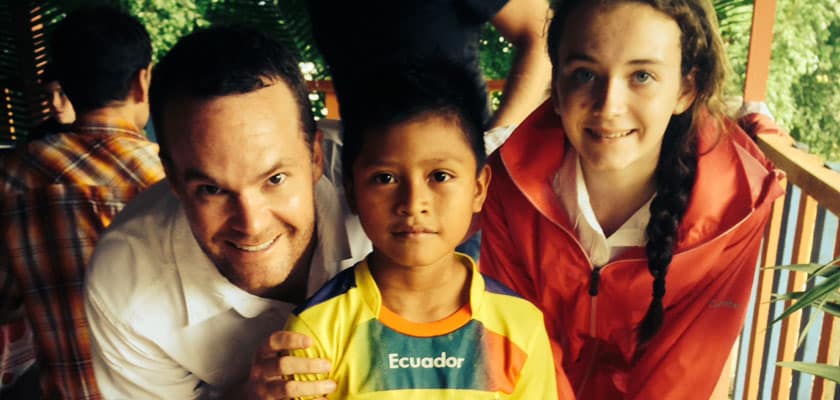YOU GOT THE POSITION... YOU'RE THE LEADER... NOW WHAT?
Menu

Remember Whitney Houston’s song “Greatest Love of All?” The pre-Bobby Brown Whitney. That girl had some pipes!
The song starts with one of the greatest clichés of all time: “I believe the children are our future…” I guess it’s a true statement, even if it’s overused and abused (hence a cliché).
This past week, I traveled to Ecuador with Compassion International. As I left the Atlanta airport (after a 2+ hour delay, of course), I found myself singing Whitney’s song while searching for an open overhead bin for my slightly over packed carry-on luggage.
Compassion International is the real deal. This amazing organization provides hope for children, families, communities, and even countries primarily through their child sponsorship program. They do other things surrounding children, as well (rescuing babies and mothers, developing future leaders, etc.), but the sponsorship program is the flagship of Compassion. You should learn more about Compassion and sponsor a few children. Currently, there are nearly 1.5 million sponsored children around the world. Many more are receiving benefits through the local churches Compassion engages. And many more still need sponsors (hint, hint).
Before I left, I assumed I would experience impoverished communities in the remote areas of Ecuador where Compassion is working through local churches to help individual children. And I did see that. But what I didn’t expect to see was the impact supporting one child has on those surrounding each child.
Here are a few things I specifically noted, and if you are a church leader, there’s a lot for us to learn here, too:
Whether you live in the Andes Mountains of Ecuador, the Amazon jungles of Ecuador, or the suburbs of the United States, parents genuinely love their children. When you care for a child, you are accepted by their parent. In each project I visited, hundreds of parents, grandparents, aunts, and uncles had come to faith and engaged in the local church because of the support being provided to a child. Without exaggeration, one child sponsorship could change 20, 30, or more people directly. The local churches working with Compassion are growing in faith and numbers, simply because they are providing hope and a future for children.
Every child has hopes and dreams. Over time, it’s life that tears them apart. In one of my home visits, we asked a mother a simple question: “What has Compassion meant to your son.” She immediately began to cry (so did I), and I’ll never forget her answer: “Compassion is allowing my son to become somebody – something that I was never able to do.” Wow.
Life can be difficult. Our circumstances and experiences have a way of beating us down and removing our hope. But when a child’s imagination is engaged and a path to hope is created, the possibilities both abound and can be realized.
Most clichés, while overused and unoriginal, are also true. In this case, children literally do represent the future. Therefore, how we engage children today in large part determines the future we will experience tomorrow.
I don’t have time now, but consider how each generation has evolved. Genetics did not create massive expressions of entitlement – our parenting did. The self-esteem movement through the 80’s and 90’s developed a generation of children who only THINK they are awesome. The greatest generation ever (as coined by journalist Tom Brokaw to describe the generation who grew up in the United States during the deprivation of the Great Depression, and then went on to fight in World War II) became “great” because of their experiences as children.
Point being: what children experience today in many ways determines how families, communities, and countries look tomorrow.
Go back to number 1. The children aren’t just our future, they represent our present, as well. Impacting children impacts entire families and communities. Do this once and change is possible. Do this enough and widespread change is inevitable.
Especially in the American culture, time is a prized possession. We want what we want when we want it. Patience is not valued. But, where we can be patient, we stand to see long-term change.
Sponsoring a child for one year provides basic needs. Sponsoring a child for a few years provides opportunities. But sponsoring a child through their childhood literally changes both the child and the child’s surrounding environment.
The projects I visited with Compassion were both long-term in nature – 27 and 30 years respectively. We met the Mayor in one community. Guess what? He was a former Compassion child. We met a Pastor. Guess again? He, too, was a former Compassion child. There were multiple parents rising above – all former Compassion children. It’s the little pushes over time that provided the ultimate payoff. We know that to be true in our health, our weight, and our leadership – but it’s also true for our children.
I guess Whitney was right, “the children are our future.” But, in many ways, these children usher in the future today in every Compassion community. There is so much more that I learned last week, but at the core, I now understand that sponsoring ONE child supports, impacts, and changes communities (and even countries) if we are willing to engage.
That is my hope for Cesar Tanguila. He’s my sponsored child. I think of him as my new son. Today, he has great hopes and dreams that I pray will be realized through his Compassion project.
If you would like to sponsor a child through Compassion, click HERE.
